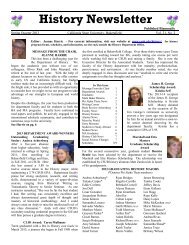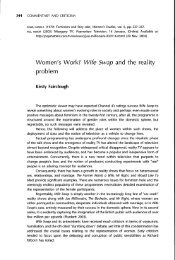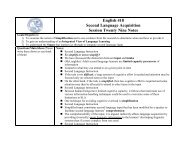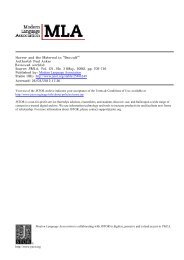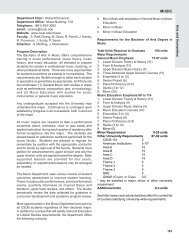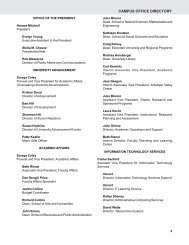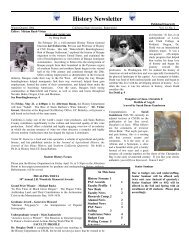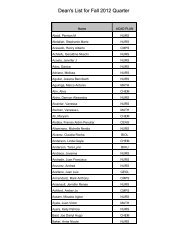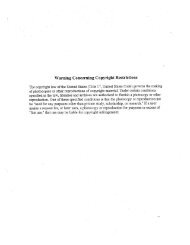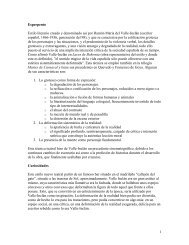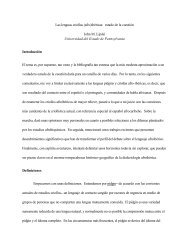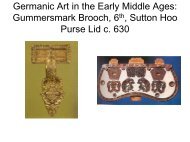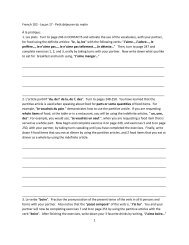''Don't Ask me, I'm Just a Girl'': Feminism, Female Identity, and The ...
''Don't Ask me, I'm Just a Girl'': Feminism, Female Identity, and The ...
''Don't Ask me, I'm Just a Girl'': Feminism, Female Identity, and The ...
You also want an ePaper? Increase the reach of your titles
YUMPU automatically turns print PDFs into web optimized ePapers that Google loves.
Don’t <strong>Ask</strong> <strong>me</strong>, I’m <strong>Just</strong> a Girl 275<br />
rise (<strong>and</strong> subsequent commodification) of ‘‘girl power’’ rhetoric; the<br />
judicial re-evaluations of Title IX legislation <strong>and</strong> the establish<strong>me</strong>nt of<br />
professional wo<strong>me</strong>n’s sports teams <strong>and</strong> leagues; <strong>and</strong> the conflicted representations<br />
of wo<strong>me</strong>n in cultural pheno<strong>me</strong>na as varied as music (e.g.,<br />
Madonna, <strong>The</strong> Lilith Fair, <strong>The</strong> Spice Girls), television (e.g., Murphy<br />
Brown, Roseanne, Ally McBeal, Buffy the Vampire Slayer), <strong>and</strong> film (e.g.,<br />
<strong>The</strong>lma <strong>and</strong> Louise, G.I. Jane, <strong>The</strong> Long Kiss Goodnight). <strong>The</strong>se complexities<br />
<strong>and</strong> ambiguities are also apparent on <strong>The</strong> Simpsons when one focuses<br />
on the show’s construction of gender roles, both male <strong>and</strong> female, as<br />
well as its incorporation of ideological norms regarding gender in<br />
A<strong>me</strong>rican culture. A full analysis of the issues attendant on feminism<br />
<strong>and</strong> female identity in popular culture <strong>and</strong> on <strong>The</strong> Simpsons is beyond the<br />
scope of this paper; therefore, this examination of <strong>The</strong> Simpsons concentrates<br />
specifically on three of the show’s primary female characters:<br />
Marge Simpson, Selma Bouvier (Marge’s sister), <strong>and</strong> Lisa Simpson.<br />
‘‘Family Values’’ <strong>and</strong> Gender Norms<br />
<strong>The</strong> initial success of <strong>The</strong> Simpsons was due mainly to the willful manipulation<br />
of the image of Bart Simpson: the show capitalized upon the<br />
archetype of the male adolescent rebel <strong>and</strong> upon the rapid commodification<br />
of easily reproducible phrases such as ‘‘Don’t have a cow, man,’’<br />
‘‘Eat my shorts,’’ <strong>and</strong> ‘‘Ay, caramba!’’ However, from the very start, <strong>The</strong><br />
Simpsons was concerned with adult the<strong>me</strong>s <strong>and</strong> with issues relevant to<br />
both <strong>me</strong>n <strong>and</strong> wo<strong>me</strong>n concerning the relationships they have with one<br />
another <strong>and</strong> with <strong>me</strong>mbers of their im<strong>me</strong>diate families. As is well<br />
known, <strong>The</strong> Simpsons is foremost a satire upon the idealized images of<br />
family life depicted by both traditional <strong>and</strong> contemporary do<strong>me</strong>stic<br />
sitcoms. Though the Simpson family is far from the <strong>me</strong>dia-constructed<br />
norm offered by television shows such as Leave It to Beaver or Father<br />
Knows Best in the 1950s or <strong>The</strong> Cosby Show <strong>and</strong> Family Ties in the 1980s,<br />
they are perhaps closer to the actual norm, a distinction well displayed<br />
in the debate over ‘‘family values’’ in the early 1990s. In a speech given<br />
at the annual convention of the National Religious Broadcasters in<br />
1992, George Bush, Sr. infamously stated that: ‘‘We need a nation<br />
closer to <strong>The</strong> Waltons than <strong>The</strong> Simpsons.’’ 6 Bush’s com<strong>me</strong>nt was a la<strong>me</strong>nt<br />
for the loss of a supposedly better <strong>and</strong> more stable past <strong>and</strong><br />
concept of family, perhaps best epitomized by the nuclear family of the



